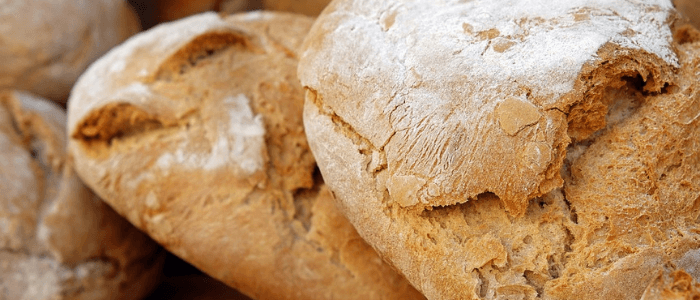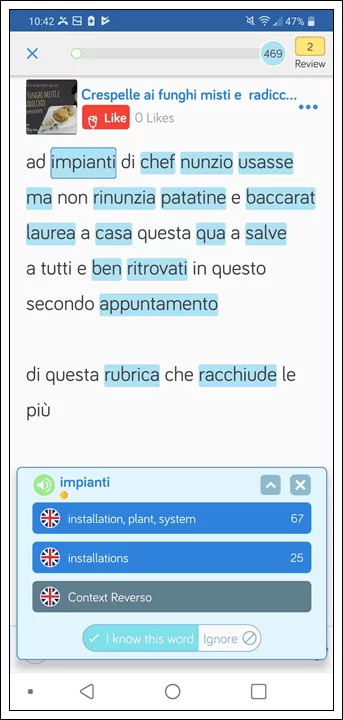Italian Sayings About Food
Food is one of the main elements of the Italian culture, therefore it shouldn’t be surprising that most of the Italian sayings and proverbs revolve around food! I’ve listed some of the more popular ones below that you can start adding to your vocabulary list.

Essere buono come il pane
Translation: To be as good as bread.
Meaning: This saying is used to describe a nice, caring and altruistic person. Similar to the English saying, to be as good as gold).
Essere una pentola di fagioli
Translation: To be a pot full of beans.
Meaning: This saying is used for someone who always talks, and it refers to the constant noise the pot makes when left on the stove to cook.
Essere dolce come il miele
Translation: To be as sweet as honey.
Meaning: To be a really sweet person.
Mettere le pere con le mele
Translations: Mixing pears and apples.
Meaning: When you pair two unrelated things.
Patata bollente
Translation: A hot potato.
Meaning: A situation which is difficult to handle.
Fare una frittata
Translation: To make an omelette.
Meaning: To make a mess, a disaster.
Rompere le uova nel paniere
Translation: To break the eggs in someone’s basket.
Meaning: To ruin someone’s plans.
Mangiare pane e volpe
Translation: To eat bread and a fox.
Meaning: A sarcastic way to state that somebody is not very smart.
Trovare il pelo nell’uovo
Translation: To find hair in an egg.
Meaning: Used to describe a really picky and meticulous way of acting.
Cavare il sangue dalle rape
Translation: To extract blood from turnips.
Meaning: You cannot make something good out of something that is naturally bad.
Piangere sul latte versato
Translation: Crying over spilt milk.
Meaning: It is pointless to cry over mistakes that have already been made and cannot be amended.
Fare le nozze con i fichi secchi
Translation: Celebrate a wedding with dried figs.
Meaning: To organise something eventful using a shoestring budget.
Preso con le mani nella marmellata
Translations: Caught with the hands in the jam jar.
Meaning: To be found in the act of doing something wrong/stealing.
Cascare come una pera cotta
Translation: To fall like a cooked pear.
Meaning: Used when somebody falls for someone’s trap or tricks in a naïve way. Also used for someone who falls in love very quickly and in an intense way.
Essere come il prezzemolo
Translation: To be like parsley.
Meaning: To be everywhere, to show up at many occasions. The analogy comes from the fact that parsley is widely used in many Italian dishes.
Una mela al giorno toglie il medico di torno
Translation: An apple a day keeps the doctor away.
Meaning: Apples are healthy fruits so it is recommended to eat them often to keep ourselves in good health.
Avere il prosciutto sugli occhi
Translation: To have ham over your eyes.
Meaning: To not notice what is clear and evident, to be unaware of the situation.
Essere un salame
Translation: To be a salami.
Meaning: To act in a dumb way, lacking intelligence.
Minestra riscaldata
Translation: Reheated soup.
Meaning: Usually refers to love or work situations, when the same thing happens again with probably the same, identical outcome.
Non tutte le ciambelle riescono con il buco
Translation: Not all donuts turn out with the hole.
Meaning: Things can’t be expected to turn out right every time.
Essere pieno come un uovo
Translation: To be as full as an egg.
Meaning: To feel stuffed, especially after a big meal.
Fare cuocere nel suo brodo
Translation: Let someone steam in their broth.
Meaning: Let someone pay for the consequences of their actions.
Essere come il cavolo a merenda
Translation: To be like a cabbage for tea break
Meaning: To be inappropriate for a specific situation or setting, to be out of place.
Gallina vecchia fa buon brodo
Translation: Old hens make good stock.
Meaning: Older hens’ meat is the best one to make broth or stock. The saying means that it is always better to trust the ones with more experience.
Nuotare nel lardo
Translation: Swimming in lard.
Meaning: To be very rich and wealthy.
Avere sale in zucca
Translation: Have salt in the pumpkin
Meaning: To be smart and clever. “Zucca” can also colloquially mean ‘head’. Moreover, during Roman times, salt was extremely valuable and used as currency. Dessicated pumpkins were considered the best way to preserve it, like natural lockers. Therefore having salt inside a pumpkin would mean to have put savings aside.
Study Italian sayings about food the fun way
And since we’ve started exploring the food side of the Italian language with these sayings, why not go the extra mile and take a look at these YouTube channel focusing on the most famous recipes of the Italian tradition?
LearnAmo – Cibo italiano: migliori piatti di ogni regione!
LearnAmo is an online portal for Italian learning, with lots of video-lessons, daily exercises and interesting trivia about Italy. In this video, they focus on the most famous recipe from each Italian region (e.g. Pizza for Campania) and tell us about its history and ingredients. The videos are captioned both in Italian and English and the full transcript are available on the LearnAmo portal.
Chef Nunzio
Chef Nunzio mainly focuses on the dishes of the Southern Italian tradition, using genuine, fresh ingredients to achieve the healthiest and tastiest results., with a funny and clever touch. You can find all kind of recipes on YouTube (Christmas, Easter, Birthday, bread and cakes etc.) and they’re captioned both in English and Italian.
ISTITUTO ITALIANO DI CULTURA DI SOFIA – Ricette della cucina italiana
This channel shares a collection of Italy’s most famous and traditional recipes, prepared by the best chefs. The audio is in Italian and English captions are available. The channel also offers a wide selection of videos about Italian movies and cultural events too.
Importing Italian Content into LingQ
Last but not least, you can import your favorite Italian content into LingQ. This way, you can read the transcript, look up your new vocabulary, create flashcards, listen to the audio, and much more… In one platform.
All you need is the LingQ browser extension. Then find a YouTube channel you like, and import the videos into LingQ.

Good luck learning Italian!
Enjoyed this post? Check out our blog post on Italian terms of endearment!
***
Giulia was born in Italy and currently lives in Scotland. She works as an English and French translator and as a teacher.


